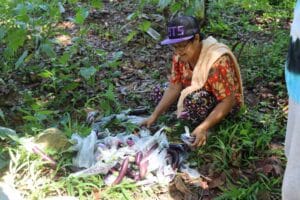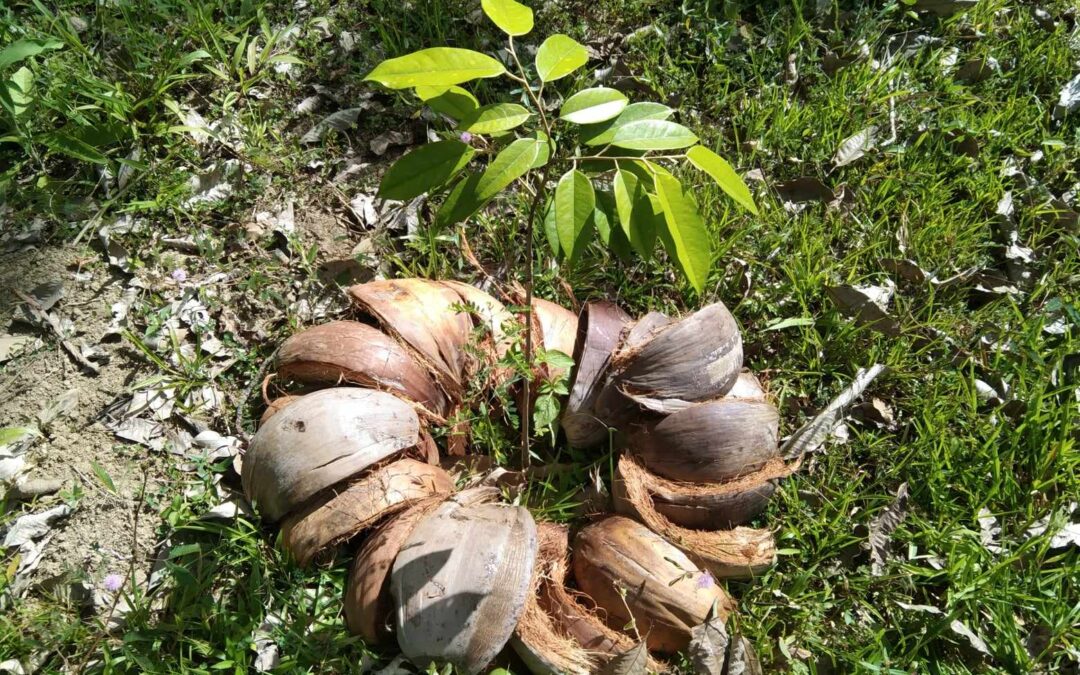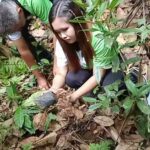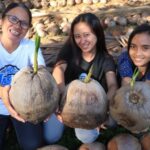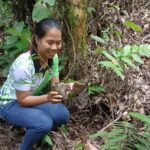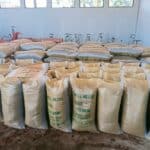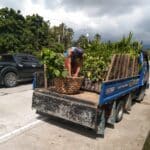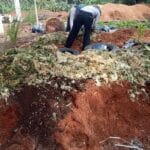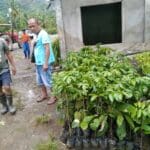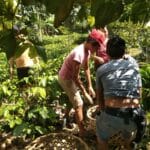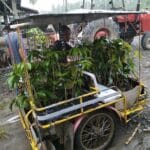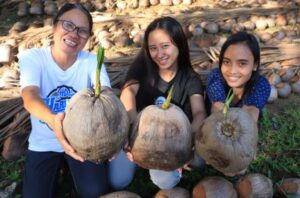
Aging demographics, dwindling youth engagement in agriculture, and widespread poverty cast shadows over the coconut industry, despite its status as the world’s second-largest producer. In response to these pressing issues, the Integrated Rural Development Foundation (IRDF), in collaboration with Livelihood Funds and Franklin Baker, embarked on a transformative journey known as the “Restoring Livelihoods and Building the Resilience of Coconut Farmers in the Philippines” project.
This ambitious initiative aimed not only to revitalize livelihoods but also to fortify communities through the widespread adoption of sustainable agricultural practices. The project stretched across the provinces of North Cotabato, Davao Occidental, and Davao Del Sur, where 46 peasant organizations and cooperatives eagerly participated in project orientations. These sessions were important, setting the stage for the project’s comprehensive approach to empowering coconut farmers and enhancing their resilience.

Crafting Empowerment: Project Components
1. Formation and Strengthening of Farmers’ Organizations: Central to the project’s strategy was the establishment and reinforcement of farmers’ organizations. Recognizing the strength in unity, the project aimed to empower farmers through collective action and decision-making. Capacity-building initiatives, including training sessions and workshops, equipped farmers with skills in organizational development, leadership, and cooperative management. By organizing into cohesive groups, farmers gained a stronger voice in advocating for their interests, accessing resources, and navigating the complexities of the agricultural sector effectively.
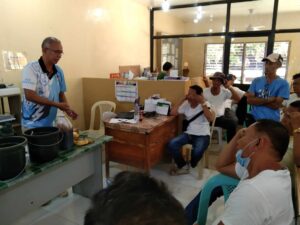
2. Direct Sourcing and Delivery: Another critical component of the project was direct sourcing and delivery, aimed at simplifying the supply chain and ensuring fair compensation for farmers. By establishing direct relationships between farmers and buyers like Franklin Baker, the project aimed to eliminate intermediaries and enable farmers to capture more value from their produce. This approach not only boosted farmers’ income but also raised transparency and accountability within the supply chain, benefiting both producers and consumers. Direct sourcing mechanisms provided farmers with enhanced market access, enabling them to compete more effectively.
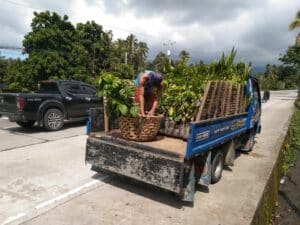
3. Coconut Productivity Enhancement and Intercropping: In addressing the challenges of productivity and diversification, the project focused on enhancing coconut productivity and promoting intercropping. Sustainable agricultural practices were promoted to maximize land productivity while preserving ecological integrity. Intercropping with matching crops offered opportunities to optimize land use and minimize risks associated with pest and disease outbreaks. By disseminating best practices and providing technical assistance, the project aimed to increase farm productivity, enhance resilience to climate change, and improve livelihoods in coconut farming communities.
Contextual Challenges: A Call to Action The context within which the IRDF Coconut Resiliency Project operated underscored the urgency of its mission. Despite the abundance of coconut trees, the sector faced numerous challenges. Aging farmers, with the majority falling between 50 to 60 years old, were grappling with the burden of maintaining senile coconut trees. The youth, enticed by the allure of urban opportunities, were abandoning agricultural pursuits, worsening the generational gap in farming. Moreover, the prevalence of landless tenants and farmers, with over half the population falling into this category, painted a grim picture of socioeconomic disparity within coconut farming communities.
Adding to these challenges were the sobering statistics of poverty among coconut farmers. A staggering 90% of coconut farmers were living below the poverty line, struggling to make ends meet amidst the abundant greenery that surrounded them. Nutrient deficiencies plagued 50% of coconut farms, while 80% remained mono-cropped, rendering them vulnerable to market fluctuations and environmental risks. In the face of these adversities, the IRDF Coconut Resiliency Project emerged as a flare of courage, offering tangible solutions to uplift farming communities and chart a path toward sustainable prosperity.
Impact and Progress: Seeds of Transformation Five years into its implementation, the impact of the coconut resiliency project resonates across farming communities, signaling a paradigm shift in agricultural practices and community dynamics. Nearly 6,000 farmers have been enrolled in the project, with over 4,500 receiving comprehensive training on sustainable agriculture and cooperative management. The ripple effects extend beyond individual farmers, reaching over 26,000 household members who are direct beneficiaries of the project’s interventions.
Crucially, the project has strengthened the social fabric of coconut farming communities by establishing 26 consolidators and partnering with 67 farmer organizations. These collaborative efforts have empowered farmers to collectively address challenges, share resources, and amplify their voices in policy dialogues. Market access has been significantly enhanced, with over 47,000 metric tons of traceable coconuts delivered directly to buyers, including Franklin Baker. This direct engagement has not only increased farmers’ income but also ensured fair trade practices and market transparency.
Moreover, the project’s emphasis on sustainability has generated promising results. Over 700 organic farms, certified to supply to brands like So Delicious, highlight the commitment to promoting environmentally friendly practices. Inter-cropping initiatives have diversified income sources and mitigated risks associated with mono-cropping.
Farmers are being empowered with resilient farming systems, particularly crucial in mitigating the impacts of El Nino and drought through the Coconut Resilience Project. Central to this effort is the education of farmers in effective Soil and Water Conservation methods. By harnessing farm waste and implementing ground mulching techniques, soil fertility is enhanced, critical for the demanding water needs of coconut trees, which require up to 16 liters of water daily. Ground mulching serves as a vital tool in maintaining soil moisture, rooted in fundamental principles of soil science, shielding plants from the stresses induced by prolonged drought or El Nino conditions.
Tailored to the diverse terrains of coconut farms, various ground mulching methods are employed. The U-Method technology is deployed in sloped areas to combat soil erosion and capture water, while the Ring Method finds application in flat coconut areas.
In addition to mulching, the project promotes the cultivation of nitrogen-rich leguminous trees such as Renzonni, Red Callandra, Arachis Pentoi, and peanut grass. These plants not only aid in ground cover and moisture retention but also play a pivotal role in weed control and serve as valuable forage for livestock, fostering a sustainable and resilient agricultural ecosystem.
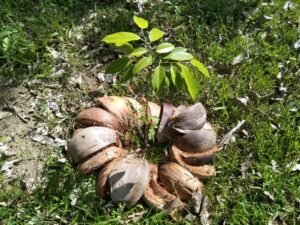
Notably, the project has generated over 650 jobs, improving working conditions for laborers and stimulating economic growth within coconut farming communities.
Gender equality lies at the heart of the project’s ethos, with half of women assuming leadership positions in farmer organizations. This conscious effort towards inclusivity has empowered women to actively participate in decision-making processes and contribute to the socio-economic development of their communities.
From an environmental standpoint, the project has rehabilitated over 9,000 hectares of land and distributed over 127,000 assorted seedlings, laying the groundwork for sustainable land management practices and biodiversity conservation.
Conclusion: Cultivating Sustainable Futures The IRDF Coconut Resiliency Project stands as a testament to the transformative power of sustainable agriculture and community empowerment. By addressing the complex challenges facing coconut farmers in the Philippines, the project has not only revitalized livelihoods but also encouraged resilient and inclusive communities. As the project continues to expand its reach and impact, it holds the promise of a brighter and more sustainable future for Filipino farming communities. From the seeds of empowerment sown in project orientations to the flourishing fields of sustainable prosperity, the journey of the IRDF Coconut Resiliency Project exemplifies the potential for positive change when communities unite in pursuit of shared goals.
